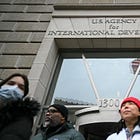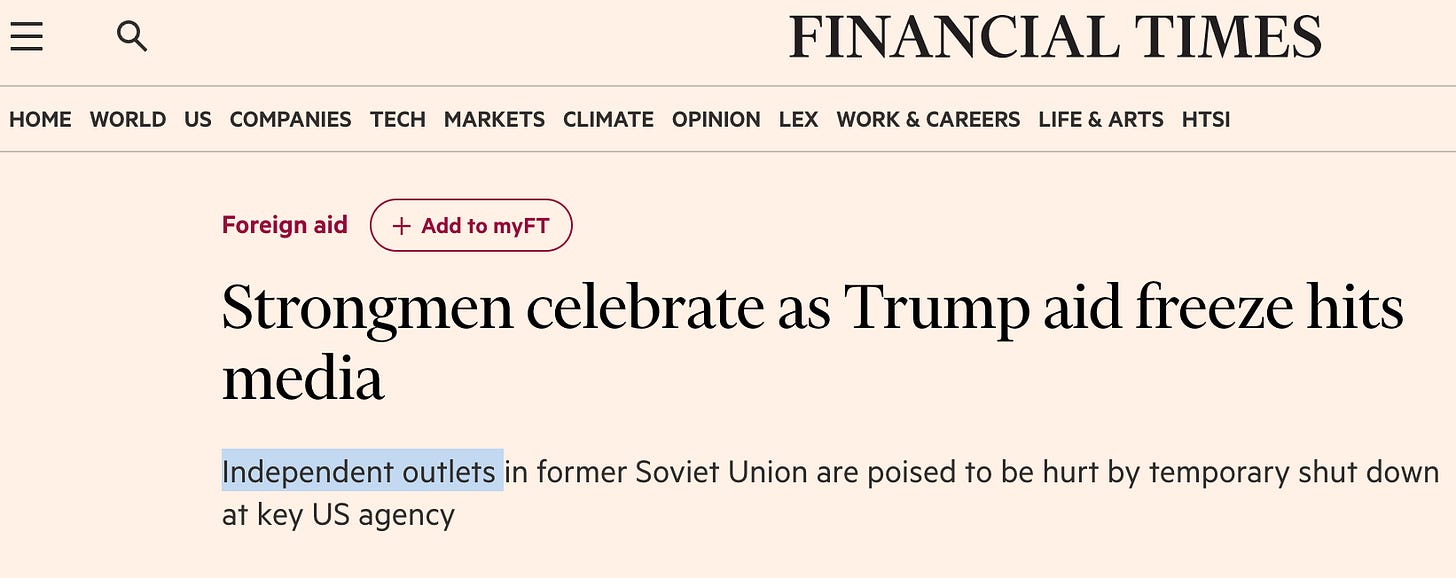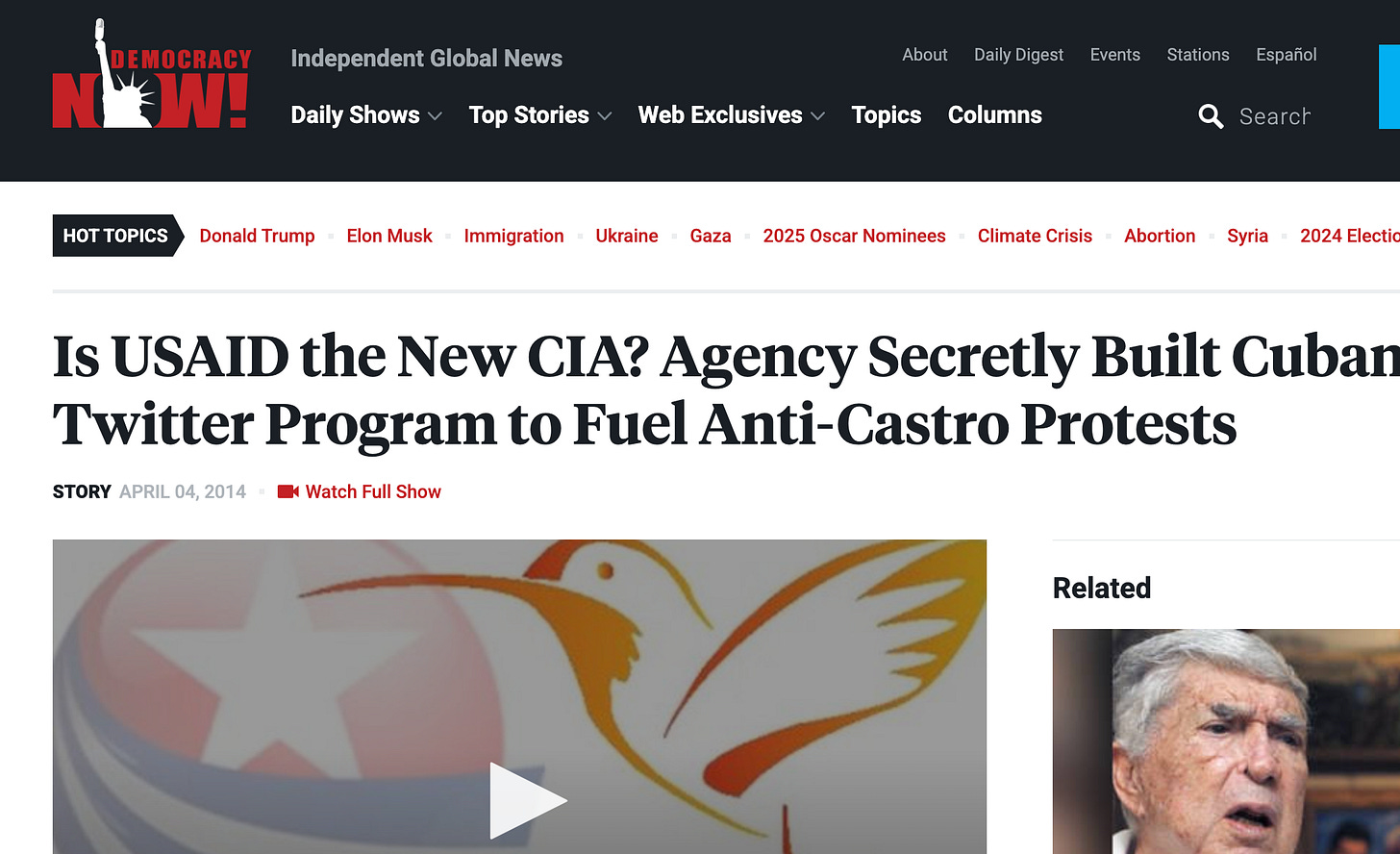A Closer Look at the USAID Revelations
Media manipulation that's worse than you thought... and more informative.
While some people remain opposed to DOGE’s inquiries into federal agency spending, the controversial Elon Musk-inspired investigations have unearthed remarkable facts at USAID and elsewhere.
Trump and Musk and their teams will of course have to answer for any and all legitimate humanitarian aid they have cut off as part of this dragnet. They should also retract the terminations of anyone found to be doing essential good work abroad. But no American should oppose the transparency these inquiries have brought to the machinations of some of our disparate unelected behemoth billion-dollar bureaucracies.
I wrote about DOGE and the connections between USAID and the CIA two weeks ago. This piece today is a slightly deeper dive after several readers expressed doubts that the revelations were, in fact, a big deal.
Here’s my original piece:
And here was one skeptical reader’s response:
A couple of million of dollars to an international media org that says a couple of things you disagree with does not seem like a major scandal to me.
This reader isn’t alone. Many Americans remain unaware of the scale of the operation because the corporate media insists on waving this damning information away—information that often implicates the corporate media itself. Instead, the media is devoting most of its ink to demonizing Trump and Musk and the drive to uncover waste, fraud, and corruption.
From Politico to Pravda?
As it turns out, we now know that “a couple of million dollars” is less than the sum that USAID and other government agencies provided to one media organization in one year. Through contractual “purchases,” government agencies provided the news website Politico with $8.4 million in 2024. A few dubious “fact checks” have attempted to muddy the waters, but the facts remain: the beltway news outfit has received in excess of $32 million since 2016. This in itself would be a medium-sized scandal, undermining the credibility of one media organ, revealing for those paying attention that it isn’t likely a coincidence that Politico concealed information on, for instance, Hunter Biden’s laptop in 2020. Many of us will now consider Politico less like an independent media operation and more like Pravda or 人民日报 (“Renmin Ribao”)—government-sponsored propaganda.
But Politico isn’t alone. Many other American media organizations have received similar covert support, and this is why it’s important. Whether or not you agree or disagree with a particular article or opinion piece in Politico or the New York Times or Reuters or any of the other news organs we now know receive government funding is not the point. Our form of government depends on an adversarial Free Press. The job of journalist is the only non-political occupation referred to in the Constitution. This unique role is called out because the Founders knew journalism was essential for a free society to flourish. Journalists are often the only non-political people who can hold government officials and political parties to account. Furthermore, listening to people who are not paid by the government speak about how our government spends our tax money and deploys our army is essential. In the famous words of Thomas Jefferson:
Were it left to me to decide whether we should have a government without newspapers or newspapers without a government, I should not hesitate a moment to prefer the latter.
A Bigger Fish to Fry: Internews
There’s a still bigger story here. While the funding of domestic American media organizations revealed by DOGE is alarming, even more awkward information came to light regarding our government’s activities overseas. The DOGE revelations have shown that the ostensibly beneficent USAID, for instance, has been founding and supporting thousands of media operations all over the world. One breathtaking example is the work of the innocuously-named Internews, which has been richly bankrolled by USAID. Internews has funded media operations in over 100 countries to the tune of well over $400 million. That largesse buys a lot of reporters, articles, and coverage, particularly in developing countries.
The transparency group Wikileaks combed through the data disclosed by DOGE and collated some astonishing numbers:
USAID has pushed nearly half a billion dollars ($472.6m) through a secretive US government financed NGO, “Internews Network” (IN), which has “worked with” 4,291 media outlets, producing in one year 4,799 hours of broadcasts reaching up to 778 million people and “training” over 9000 journalists (2023 figures). IN has also supported social media censorship initiatives… (more)
Few people, even in media studies organizations, had heard of Internews before the DOGE revelations. I published a book in 2023 after meticulously investigating media manipulation and deceit in this country, and in my years of research I never came across Internews. As it turns out, Internews boasts staffed headquarters in some 30 countries, from France to Kenya to Ukraine to Thailand, and it distributes millions of dollars annually to media operations—newspapers, magazines, websites, and television channels—around the world. The fact that such a gargantuan network that no one had heard of exists at all would alone make this inquiry worthwhile. We now know there’s a secretive media agency with tentacles all over the world spending taxpayer money to disseminate and endorse its own version of the news.
Independent Media vs. Dependent Media
American government support like this always comes with strings attached. There’s no free lunch here, as the Indian pundit Arnab Goswani succinctly explains. These thousands of media organizations in nations all around the world—perhaps unbeknownst to some of them—provide yet one more tool for the intelligence agencies to utilize when doing what they’ve always done to foreign governments: manipulate them for their own ends. Inside countries that toe the line of the current American foreign policy agenda, the intelligence agencies will bolster the establishment and cultivate allies; inside any countries who don’t toe the line, they will sow discord, chaos, and perhaps revolution. All of this is done covertly of course.
Wikileaks found that nearly all of the media organizations funded by Internews falsely identify as “independent media” while secretly relying on American support. This phenomenon is an unmistakeable and growing trend these days as faith in corporate media news continues to dwindle. Some large organization—the US government, for instance—founds and bankrolls media organizations secretly so as to make them appear independent and grassroots for the sake of credibility. In my book I call this phenomenon “astroturf independent media.” Glenn Greenwald, in his excellent reporting on this story, uses an even simpler term. Rather than calling these Internews operations “independent media,” he labels them simply “dependent media.”
Once you see this clearly, you realize how ridiculous it is for the corporate media to bellow that Trump and DOGE are “attacking independent media.” These reports never mention that the media in question is dependent on American intelligence agencies and USAID and are not disinterested players. Fully 95% of the budget for Internews comes from the US government. In Ukraine, upwards of 80% of existing media organizations collaborate with and take funding from USAID. How could anyone honestly call these sources “independent media?"
You or I might agree with much of what a USAID or Internews-funded publication says, but that is hardly the point here. Even if we applaud some of the publications’ reporting, as we’ve seen in this country, media organizations rarely publish reports or investigate stories that run counter to the interests of their funders. These thousands of news channels and newspapers sprinkled around the world are inevitably going to express and reinforce the viewpoints of their funders. Would you consider an American media organization that was primarily dependent on the Russian government for its funding to be “independent media?”
Massaging Minds Overseas
As for the viewpoints of Internews’s funder—USAID—ever since its founding in 1961, the agency has served as a “dual purpose organization.” It dispenses aid while simultaneously helping American intelligence agencies spy on foreign officials and, when necessary, plot to covertly destabilize their governments. It’s far easier for a spy to infiltrate a foreign society if he or she is there ostensibly to help with, say, teaching journalism ethics or building medical infrastructure, than if he or she arrives and simply says to the locals, “Hey, I’m here with CIA, and I need you to look at your government a little differently.”
As mentioned in my earlier piece, the fact that USAID acts to undermine foreign governments around the world is not new information. There are countless examples of this throughout the agency’s history. At one point, for instance, the agency chose a curious path to force regime change in Cuba:
If you have researched USAID, and its newer cousin, the National Endowment for Democracy (NED), you know that these two agencies have in fact resided at the very heart of clandestine American-backed coups. From Guatemala to Iran to Indonesia to Libya, time and again the intelligence agencies have worked to destabilize and (often) topple governments that are not toeing the line of American foreign policy desires. Some nations, including Russia, have expelled USAID and NED for precisely this reason.
Given this history, does anyone honestly think USAID and NED found and fund overseas media organizations to tell the truth? Could these often-nefarious agencies’ support for small news publications simply be a fervent hope that people in far-flung countries will be better informed about the world? No, sadly. USAID, NED, and the intelligence agencies are not in the business of informing people of the truth. Their bailiwick is rather steering public opinion towards the agenda of US foreign policy. The point of funding and infiltrating thousands of news organizations around the world is to massage the American foreign policy agenda into the minds of the global population.
While all of these efforts have historically been done to support revolutions and coups, today they are likely undertaken also to steer global opinion about diverse international matters such as the ongoing use of the dollar in international trade, wars in Ukraine and Palestine, global pandemic policies, the uptake of various pharmaceutical products, extraction of natural resources, climate change countermeasures, et cetera, et cetera.
Some say the funding freeze at USAID—and the movement to bring the rogue agency under the State Department umbrella—has undermined independent media. My opinion is that it will undermine only “dependent media” while allowing the growth of truly independent media to accelerate.
What do you think?
ADDITIONAL REFERENCES
A brief balanced media diet on this topic: two independent media journalists offering their opinion.
From Aaron Maté on the Left:
Musk and Trump bear responsibility for any suffering that results from their cuts to USAID’s genuine humanitarian functions. Those efforts, however, should not be conflated with those parts of the agency that have nothing to do with humanitarianism, but hegemony... (more)
From Alexander Muse on the Right:
Those who care about genuine press freedom must recognize the true nature of Internews. It is not a beacon of independent journalism, but a hegemonic force in media manipulation. Its pervasive influence must be countered with unwavering resolve, lest the very concept of free thought become a relic of the past... (more)
https://rumble.com/v6j9nn1-system-update-show-404.html
https://childrenshealthdefense.org/defender/usaid-funded-internews-network-censorship-wikileaks/
https://thehighwire.com/ark-videos/doge-audit-exposes-usaid/
https://pages.jh.edu/jhumag/0605web/hoffman.html










Surprising, Tony, with all your research for your book on media, you had not come across Internews, with its half-billion dollar budget. If a researcher like you were not aware, I could hardly hope that the general public would even have a hint.